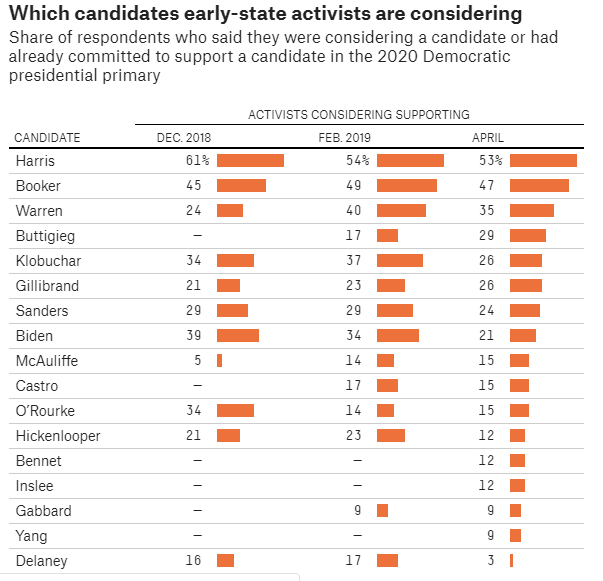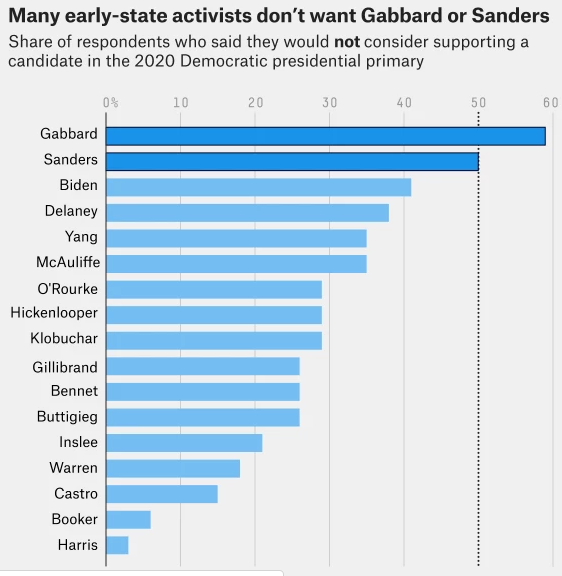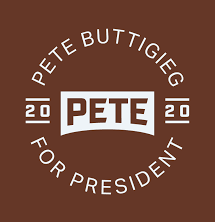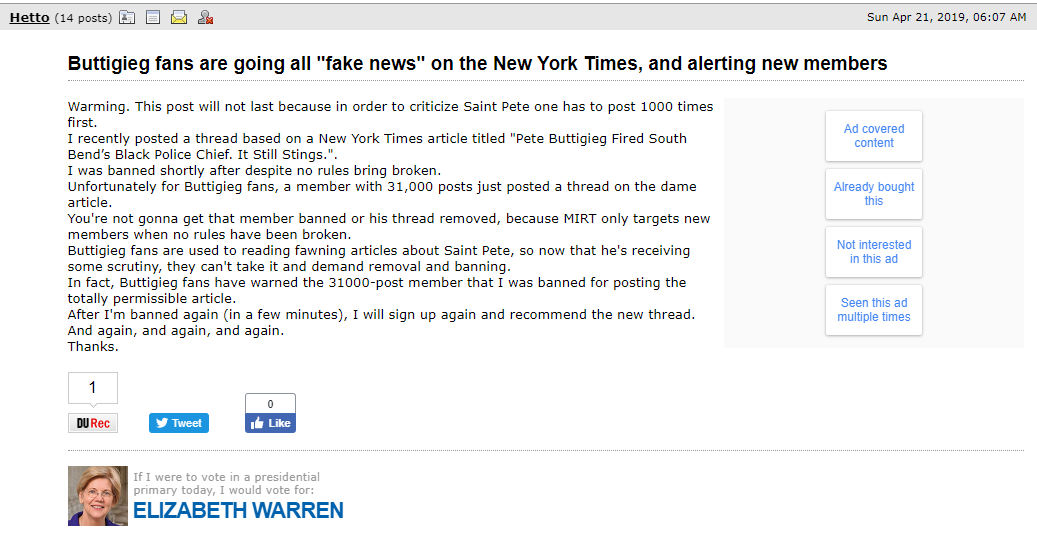Celerity
Celerity's JournalBreaking MSNBC: Biden is launching online Thursday, not a live event in person
https://www.livenewswatch.com/msnbc-news.htmlWelcome to the race VP!!!!
We Asked Democratic Activists Who They're Backing -- And Who They'd Hate To See Win
https://fivethirtyeight.com/features/we-asked-democratic-activists-who-theyre-backing-and-who-theyd-hate-to-see-win/We’re still months away from the first nominating contest in Iowa, but I’m still regularly checking in with early-state Democratic Party activists to see what the party’s most engaged members think about the pre-primary race so far. In this installment, more activists are saying they have chosen a candidate to support, and some are now considering candidates who were previously flying under the radar. We’re also getting a better sense of some of the divisions within the party by asking activists who they won’t support.
As part of my ongoing book research, I’ve been in touch with roughly 60 Democratic activists in New Hampshire, Iowa, South Carolina, Nevada and Washington, D.C.,1 asking them about their preferences for the 2020 Democratic presidential nomination. About 35 people from the respondent pool participated in each wave of interviews. I’m interested in learning about whether these activists are committed to a candidate or whom they’re considering if they still haven’t made up their mind.
This time around, I also asked respondents who they didn’t want as the nominee. After all, when a party is deciding between candidates, it needs to decide not only who is broadly liked, but also who is considered unacceptable by many factions within the party. I’m trying to get a sense of which candidates look like traditional party nominees (broadly, if not enthusiastically, accepted by most wings of the party) and which look like factional candidates (the enthusiastic choice of some segments of the party but highly problematic for others).
At this stage, most of the activists I spoke to are considering at least a few candidates, but I did see a modest increase in the number committed to just one candidate: the total who’d made up their mind jumped from nine in February to 11 in April. (Since each wave of interviews has gotten responses from a different subset of respondents, it’s important to keep in mind that some of these shifts may reflect changes in the respondent pool rather than changes in opinion.) Among the group of activists who’ve decided on one candidate, Vermont Sen. Bernie Sanders was tied for the lead, with four activists backing him, essentially unchanged from the previous round of interviews.2 New Jersey Sen. Cory Booker, who now shares the lead, went from one declared supporter in February to four in April. And still-undeclared candidate former Vice President Joe Biden actually lost at least one supporter.3 A woman who had been backing Biden told me that her concerns over his unwanted touching of women caused her to re-evaluate her decision. While she said that she is still considering Biden, she is now considering other candidates too.
snip


CNN Town Hall With Mayor Pete Buttigieg 4/22/2019 CNN (Full Event)
More videos (grouped by subject)
https://hearpetespeak.com/
some background on Regina Preston-Williams, who many news sources (and TYT etc camp)
are using to try and ratfuck Pete. Google her name plus Buttigieg and its amazing how many stories come up, almsot all of the negative.
She has a powerful motivation to to try and take him down.
Update: she was crushed in the South Bend mayoral primary, losing badly to the Buttigieg-backed candidate (she received less that 5%)
BTW, the local paper, The South Bend Tribune, is no friend of his
https://www.southbendtribune.com/news/elections/south-bend-mayoral-candidate-says-her-code-violations-will-help/article_cbd0ec12-9dfe-5422-8b90-fa72b448258a.html
SOUTH BEND — More than two years ago, the city of South Bend sued Common Council Member Regina Williams-Preston and her husband over unpaid fines from code violations on nine properties they owned.
The combined fines at one point topped $72,000.
The couple and city have since settled the cases, and Williams-Preston is now running as a Democrat for mayor. But rather than hurt her election chances, she says the case will motivate her to help other African-Americans with limited resources if she’s elected.
Williams-Preston claims the city targeted her and her husband’s properties, and those of their neighbors, with “aggressive code enforcement” to further two goals: Mayor Pete Buttigieg’s pledge to address 1,000 vacant and abandoned homes in 1,000 days, and the West Side Main Streets Plan, which calls for revitalizing the neighborhoods between Western Avenue and Lincoln Way West.
The city filed the suits against Williams-Preston and her husband, Tyrone Preston, in July 2016 — seeking $7,238 in costs and fines from her and about $65,000 from him. The couple, collectively, owned nine residential properties in the city, including their home on North Elmer Street. They planned to renovate some and demolish others.
snip
They were cited for 41 code violations, despite the homes having sat vacant for longer than a decade, and the couple couldn’t afford to pay the fines, Williams-Preston said. Some of the citations were for parking cars on the empty lots and their own yard.
Under terms of a 2017 out-of-court settlement, the city dropped the suit in exchange for Williams-Preston’s agreement to make $50 monthly payments toward a $2,131 debt, according to city records. The city ultimately demolished the three tax sale houses — two of them on the couple’s block and the third located seven blocks away – and Tyrone agreed to pay $25,000 toward the city’s demolition costs, a debt he’s paying off in $350 monthly payments, Williams-Preston said.
snip
Williams-Preston also said then-City Attorney Cristal Brisco acknowledged in a conversation that the process the city used to determine the size and number of fines levied against a property owner was too subjective.
“The city found that the way in which they assessed civil penalties was not something that they could defend in court,” she said. “They used to fine $200 or $250, but during the 1000 Houses in 1000 Days, they said well, we got to get these properties in the hands of the city, so we’re going to up those fines.”
But the city administration disputed that characterization of its position. Buttigieg spokesman Mark Bode said no one from the city would comment on Williams-Preston’s claims. But he pointed to a July 2017 email exchange between Brisco and Williams-Preston, obtained by The Tribune through a public records request, as evidence that Williams-Preston is wrongly portraying the city’s stance.
“As per our conversations over the last several months, civil penalties that were assessed without a consistent procedure were to be dismissed not just for my properties but for all residents in South Bend,” Williams-Preston wrote to Brisco, after asking her why some of her properties still had liens.
Brisco replied that the county solid waste district had imposed the liens for nonpayment of recycling fees.
“Your email,” Brisco wrote, “states that based on our conversations over the past several months, you’ve come to understand that civil penalties that were issued without a ‘consistent procedure’ were to be dismissed for all residents in South Bend. This statement implies that there is a systemic problem with the civil penalty process in South Bend … This is inaccurate, and there seems to be some confusion regarding the information I’ve previously provided to you.”
When asked this week for comment on the email exchange, Williams-Preston maintained her version of the story.
How the Media Is Getting Mayor Pete's Gentrification Story Wrong
https://washingtonmonthly.com/2019/04/21/how-the-media-is-getting-mayor-petes-south-bend-gentrification-story-wrong/South Bend, Indiana was a prosperous manufacturing town through much of the 20th century. It achieved a measure of fame for hosting the auto plant that built the Studebaker. But as the economy changed, so did the town’s fortunes. Between 1960 and 2010, its population plummeted by nearly 25 percent. Left in the wake of mass departure and economic stagnation was a rash of urban blight: thousands of homes and other buildings stood vacant, left to disrepair. With blight came decreased home values and a rise in crime.
South Bend Mayor Pete Buttigieg, now a Democratic presidential candidate, launched an initiative in February 2013 he called “1,000 Homes, 1,000 Days.” The goal: identify 1,000 vacant or abandoned homes (about a third of the total) and either demolish or repair them. By November 2015, 427 homes “were repaired, 569 were demolished, 10 were deconstructed, 6 were set aside for repair by community development corporations, and 110 were under contract for demolition,” according to the Department of Housing and Urban Development, which provided a block grant supporting the initiative. If Buttigieg’s reelection with 75 percent of the vote is anything to go by, South Bend’s citizens have signaled their approval. The city’s population has steadily increased since 2013.
Buttigieg has made the initiative’s success a centerpiece of his presidential campaign, so it should be no surprise that journalists have looked into it. But two remarkably similar stories published last week—in Buzzfeed and on CNN.com—said the initiative “smacked of gentrification.” That this odd phrase appeared verbatim in both stories is perhaps interesting. (Buzzfeed’s Henry Gomez, who published his piece first, should wonder where CNN’s Dan Merica and Vanessa Yurkevich got their inspiration.) What’s puzzling, however, is the decision to frame the demolition and rehabilitation of vacant and abandoned homes as akin to displacing minority communities. (Judging from 2011 and 2019 population estimates, no displacement appears to have occurred. What’s more, it’s hard to displace people from homes where no one was living.)
The two major challenges Buttigieg’s initiative faced were the town’s lackadaisical enforcement of building code violations and absentee owners of the targeted homes. One of the initiative’s biggest obstacles was determining if the blighted properties’ owners were both sufficiently willing and able to improve them. Both the Buzzfeed and CNN stories lean heavily on two sources: Stacey Odom and Regina Williams-Preston, two African American women who had purchased blighted properties. Odom purchased one, which she hoped to fix up and make her own home, without knowing that the initiative had already slated it for demolition. Williams-Preston had purchased three vacant homes “with plans to refurbish them and either sell them for a profit or create a business, like a day care for local kids,” CNN reported. Sadly, her husband fell seriously ill and money that would’ve gone toward their investment went toward health care instead.
Both stories strike a decidedly oppositional tone. Buzzfeed seemed particularly intent on framing the story as a conflict between a robotic, white, impersonal politician and a black community. (The word “data,” and the mayor’s abiding interest in it, somehow became grounds for opprobrium.) Ironically, both stories show Buttigieg to have been an exceptional leader. Odom struggled to get her property off the demo list, but then, as CNN reports, she had a chance encounter with Buttigieg. What happened next was governance par excellence:
snip
all of the following cities were within 300K (many much closer) in size to South Bend
based off the last full Federal census (final figures released a month or 2 before (some even after) Pete was elected Mayor in 2011)
(South Bend was 101,168)
Atlanta was just over the cut off point of 300K larger or less at 420,003
so we have
Miami 399,457
Cleveland 396,815
Oakland 390,724
Minneapolis 382,578
New Orleans 343,829
Honolulu 337,256
Tampa 335,709
St. Louis 319,294
Pittsburgh 305,704
Cincinnati 296,943
Newark 277,140 (Booker BTW, was mayor for less time there than Buttigieg was of South Bend)
Buffalo 261,310
St. Petersburg 244,769
Orlando 238,300
Birmingham 212,237
Des Moines 203,433
Salt Lake City 186,440
Tallahassee 181,376
Providence 178,042
Fort Lauderdale 165,521
Kansas City KS 145,786
Dayton 141,527
Columbia SC 129,272
Hartford 124,775
Green Bay 104,057
Boulder 97,385
Also, the South Bend metropolitan combined statistical area is is 721,296 and was close to 1 million at it's peak in the mid 1960's (massive drop off due to the rust belt de-industrialisation coming in). It isn't like it is some sleepy country village area. That 720K is bigger than 5 STATES' entire populations were when he took office. 4 now, due to ND exploding a bit due to the oil drilling/fracking over the last 10, 15 years.
Profile Information
Gender: FemaleHometown: London
Home country: US/UK/Sweden
Current location: Stockholm, Sweden
Member since: Sun Jul 1, 2018, 07:25 PM
Number of posts: 43,827

